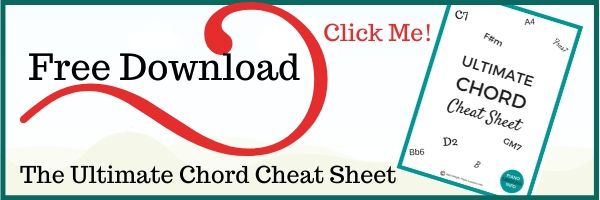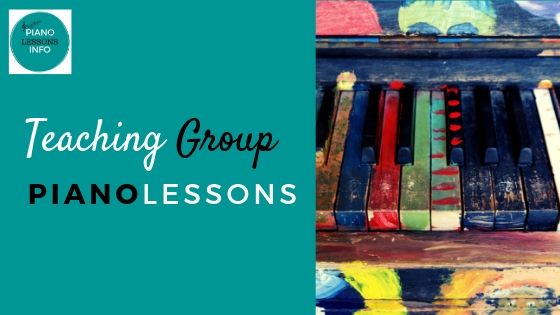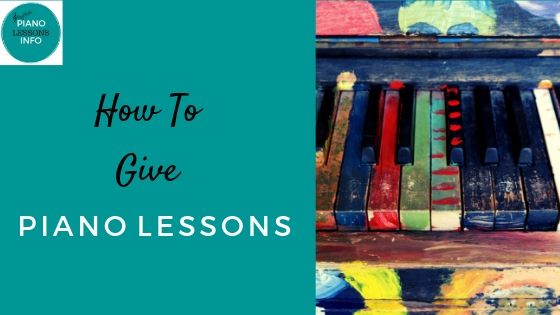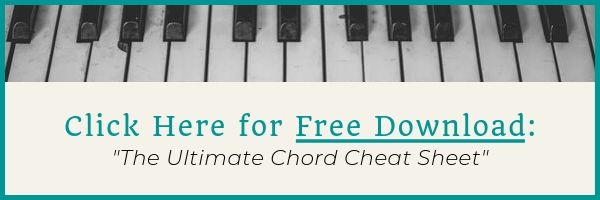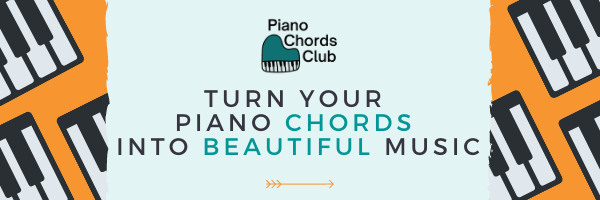Teaching Beginner Piano Lessons
Tips and Techniques
Teaching beginner piano lessons can be really fun and if you're planning of teaching piano, you'll likely end up teaching more beginners than anyone else.
Quite a few students begin but not all of them will continue on to really learn advanced piano pieces.
Here I will give some ideas of resources, activities, studio management and important things you need to address with beginners based on my experiences in teaching piano.
Chapters:
- How Long Does the Beginner Stage Last?
- Setting Up "Practice"
- Start Off With Good Habits (Be Picky)
- How to Make Lessons Fun
- Activities & Materials for Teaching Piano Lessons
- Recommended Beginner Piano Books
- Keeping Payments & Lessons Organized
- What Age Should Students Start Piano
- Can You Teach Piano Without A Degree?
- What Do Piano Lessons Cost?
- How To Prepare For Piano Lessons
- Teaching Piano At Home
- The Main Way To Teach Piano Successfully
- FAQ For Teaching Beginner Piano Lessons
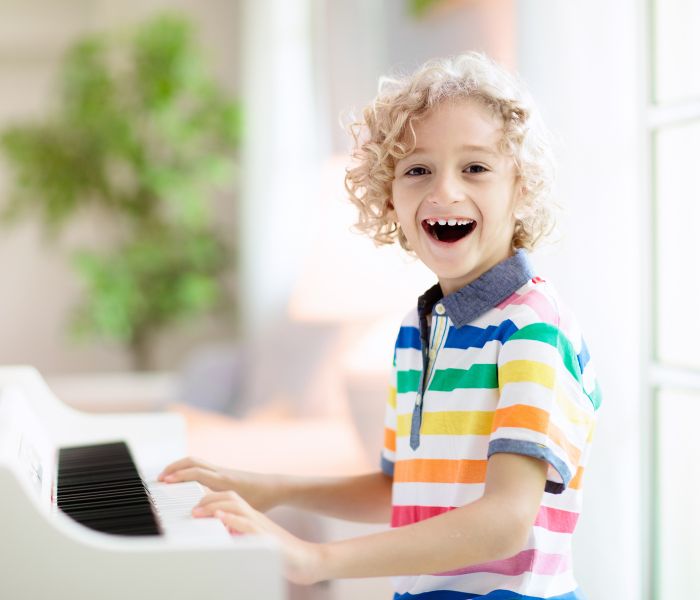
How Long Does the Beginner Stage Last?
The beginner stage of learning piano is different for every student.
It depends on a few things:
1. Age: adults and teens will get through the beginner stages of learning piano much faster than kids. Younger children (say age 5) may take up to 4 years in the beginner stage.
2. How often they practice! Kids (and adults too) who practice will move much more quickly through their beginner piano books than those who don't practice much. The difference can really be measured in years.
In general, I'd say the beginner stage for most student's is about three years.
It's good to have this in mind when starting out teaching beginners. You'll know how much you want to invest in materials and which resources you want to have one hand.
Setting Up "Practice"
Beginners start piano lessons with a lot of enthusiasm. It’s important to build on that. Do this by going slow enough that the student feels like they can do it but fast enough that they feel they are progressing well.
Now, a lot of this will depend on the student practicing. Whether they practice or not, try to get the basics down.
Speaking of practicing ...
For kids, practicing can often be the most challenging part because it's hard. They can even get through the first few weeks of lessons without actually practicing all that much.
It is important to communicate with parents and adult students right away how much your beginner should be practicing.
I usually say they need to practice a song a minimum of 5 times per week for kids who struggle to practice. This is only for the beginners at the very beginning stages who are struggling.
Really, starting off it'd be great for students to practice 15 minutes per day while songs are really short. Later on, we want to aim for 30 minutes per day, 5 days per week.
Start Off With Good Habits (Be Picky)
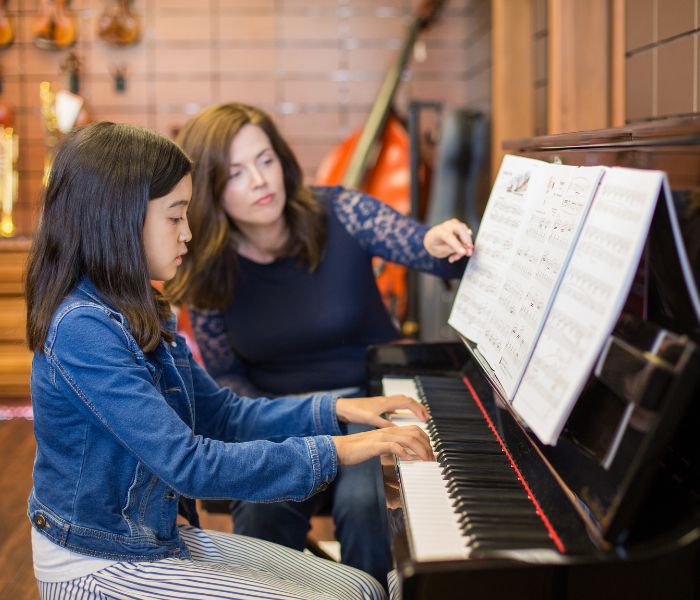
It’s really important that students start playing piano with the proper techniques. By this I mean help them avoid bad habits!
A few of the bad habits that I really tend to focus on are:
- sitting up straight at the piano (no slouching)
- no leaning wrists on the edge of the piano while playing
- keeping those fingers curled
- keeping thumbs on the keyboard when using other fingers
I will gently correct students them until it’s no longer an issue. Most pick up on it and fix it up. I also try not to nag as we want lessons to be enjoyable.
These beginning stages will impact the way they play the piano forever! Well, it’s not that serious but try to encourage good habits in teaching beginner piano lessons.
How to Make Lessons Fun
Usually beginners are children. Kids aren’t always good at sitting for half an hour straight.
One thing you can do is teach both on the piano and off.
Make learning notes into games. Moving around and not having kids sit in the same spot for the whole lesson can be really helpful. I talk about this in more detail on my how to give piano lessons page.
It can be the variety of what you do in a lesson that makes things fun and helps them go quickly for the student.
Activities & Materials for Teaching Beginner Piano Lessons
There are a few resources that are really helpful for when teaching piano lessons.
These are my go-to activities for beginner piano lessons.
Learning Rhythm with Rhythm Sticks
Every time I teach a new note, we practice it with rhythm sticks. I write out a rhythm on a whiteboard for the student to play.
Rhythms get more complicated as students learn more notes.
What I really try to teach to begin with is to count in saying "one-two-ready-go" at the same speed the student will play.
These are the type of rhythm sticks I use (on Amazon).
Whiteboard Activities
The whiteboard is my most essential resource for piano lessons. There is so much you can do.
Some of the whiteboard activities I do for beginners are:
- writing out rhythms with counts
- drawing notes, rests, clefs, dynamic signs
- creating rhythms based in a new time signature
- labeling the keys of the piano
- naming and drawing notes on the staff
It's great to have a whiteboard that has magnets like this one on Amazon.
Coloured whiteboard markers are always popular and I'd recommend them.
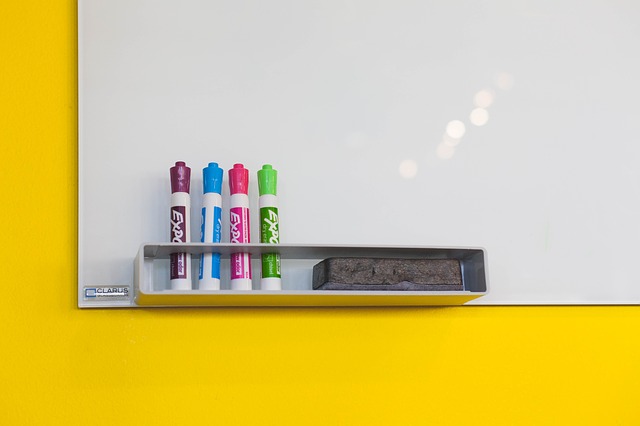
Magnetic Grand Staff
You can get a magnetic grand staff and this also provides you with a lot of activities to do. Some of these come as a whiteboard with the grand staff drawn on and have little magnets for notes.
Activities using a magnetic grand staff:
- note naming (ex. placing magnets on notes you call out)
- creating scales (including sharps or flats)
- creating chords
- sight reading
Learning notes is the main use for this one.
I really like having a variety of resources available to me to teach different things.
The Floor Staff
One of my favourite ways to learn piano off the keyboard is with a a large floor staff.
To make this: you get a fleece or micro fibre blanket (so it'll stick to the floor). Then use electrical tape to make a giant staff with the bass and treble clefs. Space your lines apart enough so that little feet or hands can fit between them.
Way to use the Floor Staff
- stand or hop of notes called out
- make it like Twister and kids have to touch four different lines or spaces at once
- through a ball or disc (like a mini frisbee) on it and name the notes
There’s lot’s of things you can do with this one and kids love it.
Recommended Beginner Piano Books
There are some good books that I would recommend in teaching beginner piano lessons.
My number one pick right now is the Piano Adventure Series. The pieces are interesting and everything is laid out well.
My second pick is the Alfred Series. My piano teacher used the Alfred books and so I did. They are good and they have a good theory book with them.
I always recommend using a lesson book and a theory book.
The book you get will depend on the age of the student you're teaching. The Alfred books for example, have a book for 4 year olds, 5-7 year olds, older kids, pre-teens / teens and adults. Teens can do the adult book.
I'd recommend going to a local music store (if you have one) to see what they carry and you can always tell them the age of your student, they'll know what books are popular and common in your area.
Keeping Payments & Lessons Organized
When teaching piano, you do need to keep organized and know who has paid what, when a lesson was missed, and so on.
You can create a spreadsheet with all your students, payments and lesson dates to do this.
When you start to get a few students - like 5 or more I'd say, organization of lesson times, payments, who needs a make up lesson starts and more starts to be a larger issue.
There is a software called My Music Staff is a great resource for piano teachers (and other music teachers as well).
What is does is:
- keeps your lesson times straight
- send auto emails & sms reminders
- create invoices and automates payments
- keeps track of students details (like emails, parents names, etc)
- keeps track of who would need a make up lesson
- has student portals which is great for parents
- and more
It's a great resource and many piano teachers have found it an absolute life saver (especially as life can be busy)!
What Age Should Students Start Piano
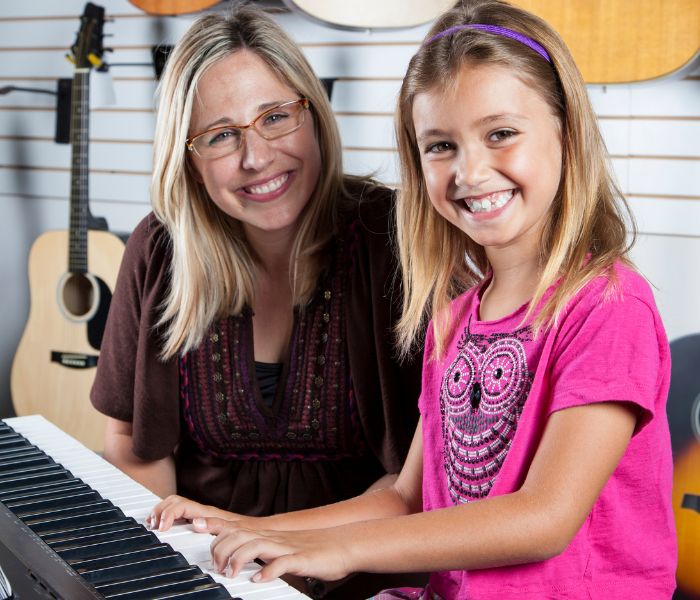
I used to take any any student who was willing but I learned the hard way not to do this. Unless a child is a bit on the prodigy side (haven't had any of these) I teach kids ages 6 or over.
There are a few reasons for this:
- They need to know the alphabet - at least the first 7 letters anyway.
- They need to be able to count.
- They need to be able to keep their right hand and left hands straight.
- Attention spans are just about long enough at age 6
Can You Teach Piano Without A Degree?
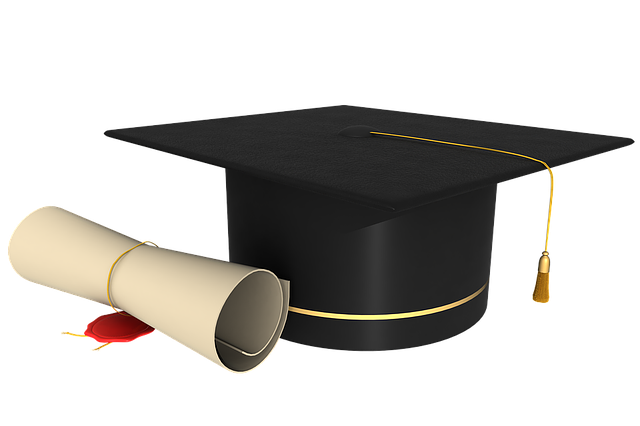
Short answer - yes. Especially if you're teaching beginner piano lessons.
In most countries when you learn classical piano, there is a piano grade that people consider the grade you can start teaching. If you've reached that, you're totally fine to start teaching.
If you haven't reached that point of learning, it'll be up to you to determine whether or not you think you can teach students well. Many parents aren't too picky (or understand) about the teachers level but you may want to be upfront regarding your own ability.
What Do Piano Lessons Cost?
How you charge for a piano lesson will depend on a few things, your area (including country and currency), your ability and your experience.
As you teach more and build a reputation for yourself, you'll be able to charge more.
But what do you charge to start off with? I'd suggest about 1.5 times the minimum wage per half hour lesson. This may be too much in some areas while just right in others.
You can always take a look online at what other teachers in your area are charging as well as stop in at your local music store and ask them. They'll have a good idea of the going rates.
How To Prepare For Piano Lessons
This is one of the best things about teaching piano. Once you have your resources on hand, there's really not much prep work to be done.
You also don't know ahead of time what your student has practiced and how much and if they'll need to move on to new songs or not.
For me, the lesson itself is mostly "teach it as it comes up".
It is important to have your home tidy, piano ready, piano light on, and things like that. That is about the extent of my prep work unless I know a student will be learning a certain topic soon and I want to have an "off-piano" activity or resource available.
If you'd like to see the general flow of how my lessons are laid out, visit the how to give piano lessons piano page.
Teaching Piano At Home
If you are planning on teaching piano at home, you'll do as most piano teachers do. Here are a few tips on this.
Have a dedicated space where you will always teach and have your resources stored. This will minimize the time spent setting up for a piano lesson. If will also give you flexibility during the lesson to pull a resource out that's needed.
Remove distractions from your teaching area. This can include noisy kids (of yours), sounds like TV going, cooking during lessons and things of that nature. You do want it to be pretty quiet. You may also want to remove anything that a child would look at and want to start investigating. This might include toys, sparkly objects or anything remotely interesting.
It's also good to have a spot for parents to sit and wait if that's what they'd like to do.
The Main Way To Teach Piano Successfully
If you want to be good at what your do and be great at teaching beginner piano lessons, all you need to do is start. Then keep trying to improve as a teacher.
It's the same as learning piano, it takes practice. The more you teach, the better you'll teach.
Now, Go Out and Get Some Students!
These are my basics for teaching beginner piano lessons. I really hope some of these tips will help you to be a great piano teacher and that your lessons will go well.
For more, you can see an outline of what my typical piano lesson looks like at how to give piano lessons.
You can also read more about teaching kids at teaching children piano.
If you want to think about teaching group lessons, visit my teaching group piano lessons page here.
Happy teaching!
FAQ For Teaching Beginner Piano Lessons
Do I need to be an excellent or professional pianist when teaching beginner piano lessons?
Do I need to be an excellent or professional pianist when teaching beginner piano lessons?
You need to be pretty proficient and be able to play piano well in order to teach beginners but you don't need the highest qualifications or to be a professional.
Aside from your skill at playing piano, what you really need is the interest and ability to teach. Some of this skill will come with time so if you're just starting out, know that it will develop the longer you do this.
How long should each piano lesson be?
How long should each piano lesson be?
I teach all my beginner lessons for 30 minutes. Not all of it is playing. About half of my lessons are theory or exercises.
How often should lessons be?
How often should lessons be?
I teach piano lessons on a weekly basis except during school holidays. If you are just starting out and don't have kids, take note that you will have some time periods where you are not teaching.
Adults tend to go throughout the year but are much less dependable in general. :)
What basic skills should I prioritize in the initial lessons?
What basic skills should I prioritize in the initial lessons?
Start with proper posture, hand positioning, finger numbers, and basic keyboard geography. Introduce basic rhythm patterns, note reading, and simple songs to keep students motivated. Most good piano books will take care of leading the student (and you) through all of this.
How can I keep my students motivated?
How can I keep my students motivated?
Rather than keeping students motivated, as they generally start out super motivated and then this drops off, I'd focus instead on creating routines.
The lesson routine, practice routine and communicating with parents if things fall of the rails a bit. That is a great way to start and what I focus on.
How can I handle students who seem disinterested or are struggling?
How can I handle students who seem disinterested or are struggling?
If you have a student who is struggling, check on how often they are practicing. If they are trying to practice but are having a hard time, consider slowing your learning pace down, spending some time reviewing concepts, doing more games and activities to cement what they've learned and possibly switching to a book for a younger age range.
If they aren't practicing, talk to the parents about practicing more.
If your student is disinterested, it is a good idea to have a chat with the parent and student about it. You don't have to teach them if it is really a struggle and makes your lesson something you just have to get through. Most students are interested though. They just don't practice enough.
Can I incorporate technology into my lessons?
Can I incorporate technology into my lessons?
Yes, but if you're teaching kids, know that they parents are paying you for your time. It may be better to suggest online games or resources for at home. Some parents would prefer kids to have less screen time.
The main way I use tech is to play a song the kids like and when they are learning chords and we play along with the song and that's about all I do.
How do I handle payments?
How do I handle payments?
It's important to set clear policies upfront. Decide on your rates, cancellation policies, and preferred payment methods and let everyone know at the start of lessons.
Do I need a dedicated studio space for teaching beginner piano lessons?
Do I need a dedicated studio space for teaching beginner piano lessons?
While having a dedicated space can be beneficial, it's not always necessary. Just ensure that the teaching environment is quiet, free from distractions, and conducive to learning.
